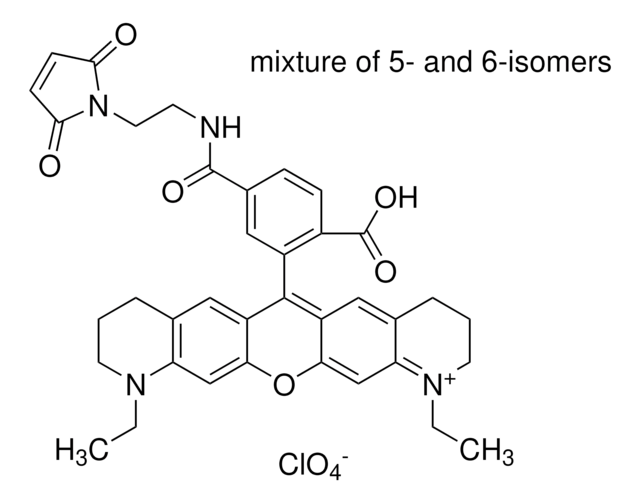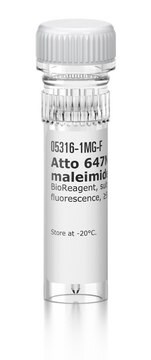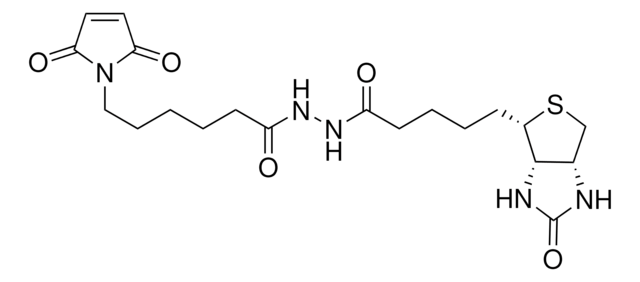Alle Fotos(1)
Wichtige Dokumente
80661
Atto 655-Maleimid
BioReagent, suitable for fluorescence, ≥90% (coupling rate)
Anmeldenzur Ansicht organisationsspezifischer und vertraglich vereinbarter Preise
Alle Fotos(1)
About This Item
Empfohlene Produkte
Produktlinie
BioReagent
Qualitätsniveau
Assay
≥90% (coupling rate)
Form
powder
Hersteller/Markenname
ATTO-TEC GmbH
Fluoreszenz
λex 663 nm; λem 684 nm in 0.1 M phosphate pH 7.0
Eignung
suitable for fluorescence
Lagertemp.
−20°C
Anwendung
Die Atto Fluoreszenzfarbstoffe wurden für die hochsensitive Anwendung bis hin zur Einzel-Molekül-Detektion (SMD) entwickelt. Sie haben eine starre Molekülstruktur, was das Auftreten einer cis-trans-Isomerisierung unterbindet. Daher besitzen diese Farbstoffe eine ausserordentlich hohe Fluoreszenzintensität mit einer geringen spektralen Verschiebung nach der Kopplung an Biomoleküle.
Rechtliche Hinweise
This product is for Research use only. In case of intended commercialization, please contact the IP-holder (ATTO-TEC GmbH, Germany) for licensing.
Lagerklassenschlüssel
11 - Combustible Solids
WGK
WGK 3
Flammpunkt (°F)
Not applicable
Flammpunkt (°C)
Not applicable
Persönliche Schutzausrüstung
Eyeshields, Gloves, type N95 (US)
Hier finden Sie alle aktuellen Versionen:
Besitzen Sie dieses Produkt bereits?
In der Dokumentenbibliothek finden Sie die Dokumentation zu den Produkten, die Sie kürzlich erworben haben.
Bengang Xing et al.
Chemistry (Weinheim an der Bergstrasse, Germany), 17(50), 14170-14177 (2011-11-16)
The molecular interactions of the glycopeptide antibiotic vancomycin (Van) with bacterial cell wall analogues N,N'-diacetyl-L-Lys-D-Ala-D-Ala (Ac(2) KdAdA) and N,N'-diacetyl-L-Lys-D-Ala-D-Lac (Ac(2) KdAdL) were investigated in neat water, phosphate buffer and HEPES buffer by using fluorescence correlation spectroscopy (FCS) and molecular dynamics
Ruixue Zhu et al.
The journal of physical chemistry. B, 115(17), 5001-5007 (2011-04-12)
Atto655 has been widely used as an excellent probing dye through photoinduced electron transfer (PET) for biochemical processes in oligonucleotides or polypeptides. However, its photophysical properties in the presence of the quenchers guanosine and tryptophan have not been carefully studied.
Eilon Sherman et al.
Chemphyschem : a European journal of chemical physics and physical chemistry, 12(3), 696-703 (2011-01-29)
Intramolecular dynamics in the denatured state of a protein are of importance for protein folding. Native-like contact formation within the ensemble of denatured conformations of a protein may guide its transformation towards the native conformation. The efficiency of folding is
Achim Friedrich et al.
FEBS letters, 581(8), 1644-1648 (2007-04-03)
This article presents a new, highly sensitive method for the identification of single nucleotide polymorphisms (SNPs) in homogeneous solutions using fluorescently labeled hairpin-structured oligonucleotides (smart probes) and fluorescence single-molecule spectroscopy. While the hairpin probe is closed, fluorescence intensity is quenched
Søren Preus et al.
Chembiochem : a European journal of chemical biology, 13(14), 1990-2001 (2012-09-01)
Förster resonance energy transfer (FRET) is a powerful tool for monitoring molecular distances and interactions at the nanoscale level. The strong dependence of transfer efficiency on probe separation makes FRET perfectly suited for "on/off" experiments. To use FRET to obtain
Unser Team von Wissenschaftlern verfügt über Erfahrung in allen Forschungsbereichen einschließlich Life Science, Materialwissenschaften, chemischer Synthese, Chromatographie, Analytik und vielen mehr..
Setzen Sie sich mit dem technischen Dienst in Verbindung.


